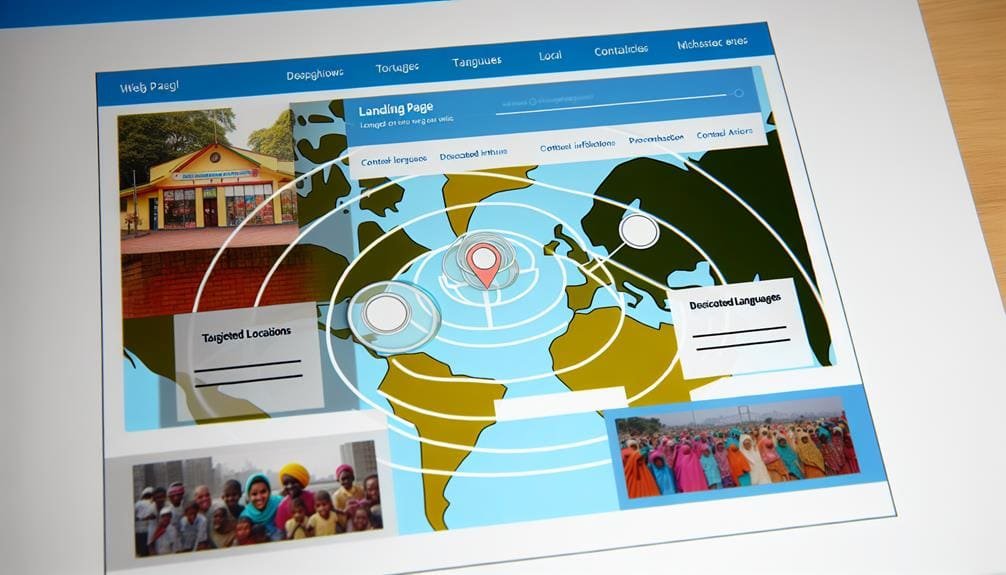3 Key Geo-targeted Landing Page Design Strategies
Reading Time: 3 minutes Designing landing pages becomes crucial as businesses strive to reach their target audience in specific locations. We’ve found that implementing geo-targeted landing page design strategies can significantly impact user engagement and conversion rates. By tailoring content and keywords to local preferences, businesses can enhance their visibility in search results and create a more personalized experience for potential customers. But what are the most effective strategies for achieving these goals? Let’s explore three critical geo-targeted landing page design strategies that have proven to be actionable and data-driven, helping businesses connect with local audiences and drive meaningful results effectively. Understanding Local User Intent When analyzing local user intent, it is essential to understand users’ specific needs and desires within a particular geographic area as they conduct online searches. Local user intent is a critical aspect of local SEO and involves comprehending the unique requirements of individuals based on their geographic location. By understanding the local customers’ search behavior, businesses can create geo-targeted landing pages and geo-targeted content that directly addresses the needs of their local audience. This understanding goes beyond simply knowing the user’s physical location and delves into the specific intent behind their searches. Proximity to local businesses, landmarks, and services significantly shapes local user intent. To effectively address local user intent, businesses should optimize their Google My Business profile and create geo-targeted landing pages that provide relevant and location-specific information. By aligning content with local users’ needs and desires, businesses can enhance their visibility in local search results, improve user engagement, and drive conversions. Understanding local user intent is crucial for developing tailored strategies that resonate with the local audience, ultimately leading to a more personalized and impactful user experience. Implementing Geo-Specific Keywords Understanding local user intent provides valuable insights for implementing geo-specific keywords to enhance the relevance and visibility of landing pages in local search results. Geo-specific keywords tailored to the targeted geographic areas are crucial in improving the local SEO performance of landing pages. By incorporating geo-specific keywords into meta tags, headings, and content, businesses can increase their chances of appearing in local search results and reaching potential customers in specific regions or localities. Crafting custom landing pages with localized content and geo-specific keywords improves the page’s relevance and enhances its visibility to local audiences. To effectively implement geo-specific keywords, it’s essential to understand users’ search intent in specific locations and create content that addresses their localized needs. Strategically utilizing geo-specific keywords can significantly boost the performance of landing pages in local search results and elevate the overall geo-targeted marketing efforts. Optimizing for Location-Based User Experience How can we optimize landing pages for location-based user experience to enhance local search performance and engagement? To ensure a practical location-based user experience, consider the following strategies: Tailor content: Address specific local queries and provide relevant answers to the audience’s inquiries. Understanding the searchers’ intent and offering practical, localized information enhances the user experience. Content format: Use concise and skimmable formats, tailoring the content based on different search intents. This helps provide easily digestible and relevant information to the local audience. Local keywords: Optimize for local keywords and ensure the landing page is an authoritative guide or comparison chart for the specific location. This aids in improving search engine optimization for location-based queries. Website structure: Consider placing the geo-targeted landing page within the structure to ensure easy navigation and accessibility for users. This can enhance the overall user experience and engagement for potential customers seeking local businesses. Optimizing landing pages for location-based user experience improves engagement. It increases the chances of visibility on platforms like Google Business, GEO Targeting, and Google Maps, ultimately benefiting local businesses in reaching their potential customers. Frequently Asked Questions What Is a Geo-targeted Landing Page? Geo-targeted landing pages cater to local searchers by presenting localized content, regional preferences, location-based offers, and personalized experiences. They utilize geographical segmentation, targeted promotions, customized messaging, and local SEO to aid demographic targeting and regional ad campaigns. What Is Geo-targeting Techniques? Geo-targeting techniques optimize marketing by tailoring content to specific locations. Benefits include localized content, customer segmentation, personalized user experience, and targeted advertising. Geofencing strategies and regional targeting enhance location-based marketing for improved conversion rates. How Do I Create a Targeted Landing Page? Creating a targeted landing page involves understanding user behavior, local demographics, and local competition. It requires optimizing page design, ad copy, and call-to-action placement while testing for conversion rates and mobile responsiveness. What Are Geo-targeting Keywords Examples? Geo-targeting keywords include ‘HVAC services in Phoenix’ or ‘best pizza in New York City.’ They’re crucial for local SEO, location-based marketing, and reaching a regional audience. Using them ensures geographic segmentation and area-specific messaging.
3 Key Geo-targeted Landing Page Design Strategies Read Post »


